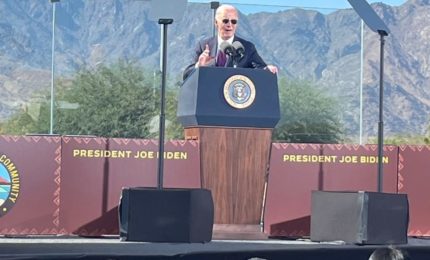President Joe Biden formally apologized to the Native American community for the federal government’s century-long Indian boarding school policy, which aimed to assimilate indigenous children. Describing the policy as a “sin on our soul,” Joe Biden acknowledged the profound harm caused by the forced removal of indigenous children from their families and the loss of their cultural heritage. Speaking in Arizona at the Gila Crossing Community School, a tribally controlled institution, he declared the apology as one of his most impactful actions as president.
The apology comes days before the general election, giving Joe Biden a unique platform to show support for Native American communities in Arizona, a key swing state he narrowly won by 10,000 votes in 2020. “It’s long overdue,” Biden said to the crowd, his words underscoring the ongoing reconciliation efforts. While Biden’s administration has allocated billions of dollars to support Native American communities, advocates argue that more extensive reparative actions are needed.
The Indian Boarding School Legacy and Its Impact on Indigenous Communities
The Indian boarding school policy, which began in 1819 and continued until the 1970s, forced thousands of Native American, Alaska Native, and Native Hawaiian children into government- and church-run institutions. The primary goal was to erase indigenous culture and assimilate children into white American society. Children were subjected to harsh conditions, facing physical and emotional abuse, starvation, and punishment for speaking their native languages. Tragically, some children died due to the maltreatment and neglect they endured.
With over 523 government-funded boarding schools, indigenous children were often taken far from their homes, permanently severing them from their families and heritage. The practice left a lasting scar on Native American communities, with the impacts of this cultural erasure still felt today. President Biden’s formal apology is an attempt to acknowledge this painful chapter and promote healing within these communities.
Joe Biden Administration’s Efforts Towards Justice and Reconciliation
Under Joe Biden’s administration, the U.S. Department of Interior initiated the first-ever federal investigation into the Indian boarding school system, seeking to address its harmful history. The investigation, led by Interior Secretary Deb Haaland, the first Native American to serve in a U.S. cabinet position, focuses on collecting and preserving the experiences of survivors. Last year, Haaland embarked on a national tour, speaking with survivors and their families to amplify their voices and document their painful experiences.
In addition to the investigation, the Department of Interior has launched an oral history project to capture survivors’ stories. By documenting these accounts, the administration hopes to honor those who endured the boarding schools and provide resources for communities to heal. Despite these measures, Native American leaders argue that further actions, such as additional funding and resources for mental health services, are necessary to address the full scope of trauma caused by the boarding school era.
Comparisons with Canada’s Reconciliation Efforts
The U.S. efforts to confront its Indian boarding school legacy have often been compared to Canada’s approach to a similar policy. In 2008, Canadian Prime Minister formally apologized for Canada’s residential school system, which also sought to assimilate indigenous children by removing them from their families. Canada’s apology was accompanied by the establishment of a Truth and Reconciliation Commission, which documented the history and effects of the residential school system, culminating in a comprehensive report with calls to action.
The Joe Biden administration’s steps mirror Canada’s acknowledgment, but indigenous advocates believe the U.S. has much to learn from its northern neighbor’s comprehensive approach. By creating avenues for justice, healing, and reparative actions, the United States can further address the historical harms of the boarding school era, providing a path towards true reconciliation for Native American communities.














